Verification of East Pacific ghost storm tracks of November-December 2019
I falsely detected tropical cyclogenesis in East Pacific (north of the
equator and east of 140W longitude) 11 times in November and December of
2019. During that period, I falsely detected crossover from Atlantic to
East Pacific thrice. Tracks were made of nine systems.
In the calculations, crossover into Atlantic as a tropical cyclone is considered equal to dissipation, and crossover from Atlantic as a tropical cyclone is considered equal to formation or regeneration. Exiting the East Pacific tracking map through its left edge is also considered equal to dissipation.
At the lead time of 1 day (24 hours), there was 1 false detection.
At the lead time of 2 days (48 hours), there was 1 false detection.
At the lead time of 3 days (72 hours), there was 1 false detection.
At the lead time of 4 days (96 hours), there was 1 false detection.
At the lead time of 5 days (120 hours), there was 1 false detection.
At the lead time of 6 days (144 hours), there was 1 false detection.
At the lead time of 7 days (168 hours), there was 1 false detection.
At the lead time of 8 days (192 hours), there were 2 false detections.
At the lead time of 9 days (216 hours), there were 2 false detections.
At the lead time of 10 days (240 hours), there were 2 false detections.
At the lead time of 11 days (264 hours), there were 2 false detections.
At the lead time of 12 days (288 hours), there were 2 false detections.
At the lead time of 13 days (312 hours), there were 4 false detections.
At the lead time of 14 days (336 hours), there were 5 false detections.
At the lead time of 15 days (360 hours), there were 6 false detections.
At the lead time of 16 days (384 hours), there were 6 false detections.
At the lead time of 2 days (48 hours), there was 1 false detection.
At the lead time of 3 days (72 hours), there was 1 false detection.
At the lead time of 4 days (96 hours), there was 1 false detection.
At the lead time of 5 days (120 hours), there was 1 false detection.
At the lead time of 6 days (144 hours), there was 1 false detection.
At the lead time of 7 days (168 hours), there was 1 false detection.
At the lead time of 8 days (192 hours), there were 2 false detections.
At the lead time of 9 days (216 hours), there were 2 false detections.
At the lead time of 10 days (240 hours), there were 2 false detections.
At the lead time of 11 days (264 hours), there were 2 false detections.
At the lead time of 12 days (288 hours), there were 2 false detections.
At the lead time of 13 days (312 hours), there were 4 false detections.
At the lead time of 14 days (336 hours), there were 5 false detections.
At the lead time of 15 days (360 hours), there were 6 false detections.
At the lead time of 16 days (384 hours), there were 6 false detections.
Ghost storm L#76
These Atlantic cyclogeneses began in October. Not all of them included crossover to EPac.
November 1, 06Z run:
Ghost storm E#55
These tracks began in October. This ended up being just disorganized cloudiness (near 10N 115W in the following TWO graphic)
November 9, 06Z run:
System E#56
was not a ghost storm. Rather, it was Raymond.System E#57
was not a ghost storm. Rather, it was (also) Raymond.System E#58
was not a ghost storm. Rather, it was TD 21E.Ghost storm E#59
This can't be identified.
November 17, 12Z run:
Ghost storm L#78
There are several of these Atlantic-originating tracks, but only one with a crossover to East Pacific.
November 20, 06Z run:
Ghost storm E#60
November 22, 12Z run:
November 23, 06Z run:
November 25, 12Z run:
Ghost storm L#81
There were two of these Atlantic tracks ; only one had a crossover.
November 24, 06Z run:
Ghost storm E#61
December 2, 12Z run:
December 5, 12Z run:
December 6, 12Z run:
Ghost storm E#62
December 11, 12Z run:
Ghost storm E#63
December 21, 12Z run:
December 24, 12Z run:
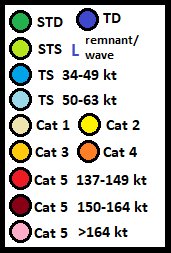



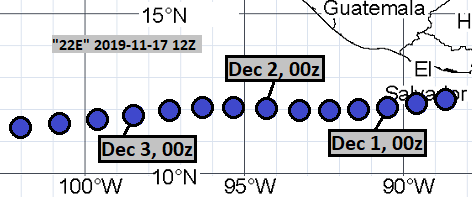

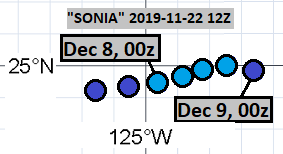

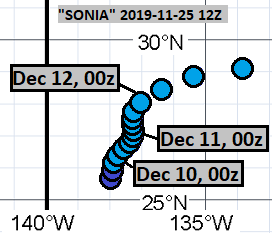

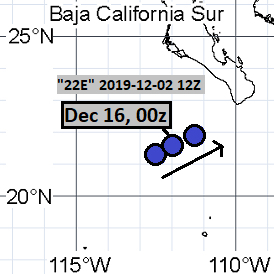

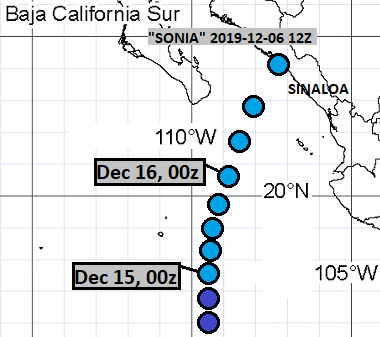
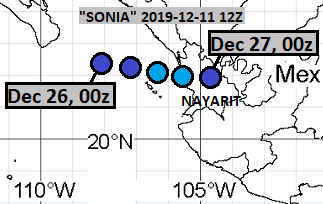
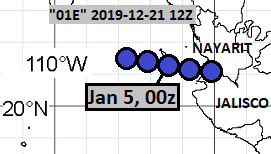
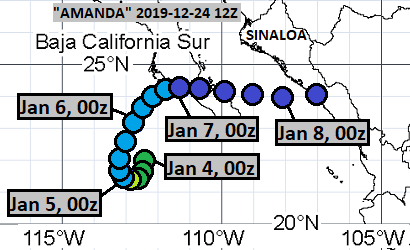
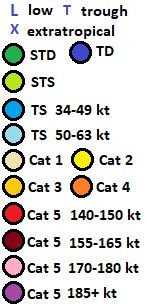
Comments
Post a Comment